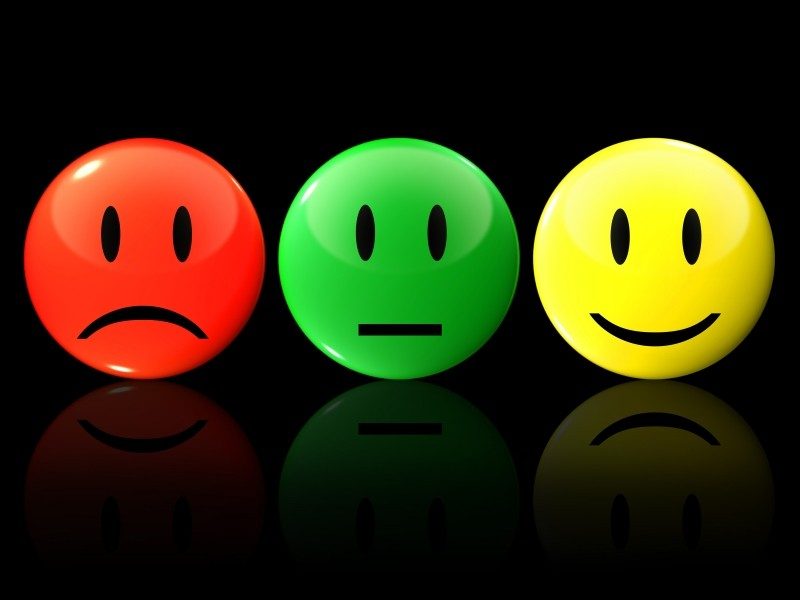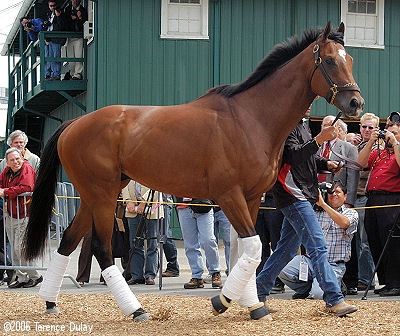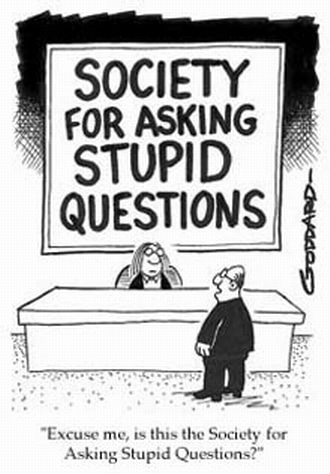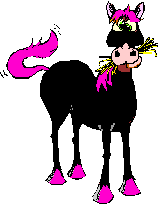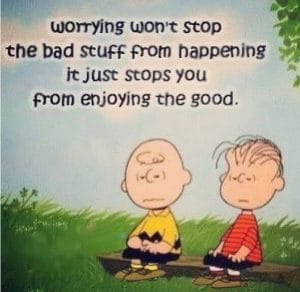 I am not a big fan of worry. As I’ve said many times, I think that people worry about their horses too much. Some concern is great. But I think too much concern sometimes saps enjoyment from the horse world. Plus, excessive concern is a great target for people trying to market products (see, for example, most supplements).
I am not a big fan of worry. As I’ve said many times, I think that people worry about their horses too much. Some concern is great. But I think too much concern sometimes saps enjoyment from the horse world. Plus, excessive concern is a great target for people trying to market products (see, for example, most supplements).
Don’t get me wrong. I understand why there’s reason for some concern. People invest a lot of time and emotional energy into their horses, and a good bit of money, too. Being concerned about problems that a horse might have is certainly understandable. But too much concern is another thing entirely. Too much concern is a bad thing. Too much concern breeds anxiety. Anxiety causes all sorts of needless expenditures for problems that, even if they do exist, are likely to go away on their own most of the time. Too much concern about every little thing makes horse owning less fun. So here’s something to think about.
Ever hear of the 80-15-5 Rule? The 80-15-5 rule suggests that everything in life can be divided into groups of 80%, 15%, and 5%. It’s got a lot of applications. And it kind of works with horses and horse medicine, too.
Here’s what I mean.
 I think that about 80% of all of the time, horses get along just great. If it’s a medical problem that’s afflicting the horse, he is going to get better 80% of the time, no matter what is done to him (as long as it’s not something that causes overt harm). Or, if you go out for a ride, about 80% of the time it’s going to be a lot of fun, and you’ll want to come back again soon.
I think that about 80% of all of the time, horses get along just great. If it’s a medical problem that’s afflicting the horse, he is going to get better 80% of the time, no matter what is done to him (as long as it’s not something that causes overt harm). Or, if you go out for a ride, about 80% of the time it’s going to be a lot of fun, and you’ll want to come back again soon.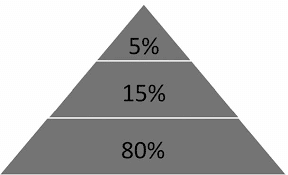 You probably enjoy your horse at least 80% of the time. Maybe 15% of going out is drudgery – you do it because you have to, but not necessarily because you want to. Maybe 5% you’d just as soon stay at home.
You probably enjoy your horse at least 80% of the time. Maybe 15% of going out is drudgery – you do it because you have to, but not necessarily because you want to. Maybe 5% you’d just as soon stay at home.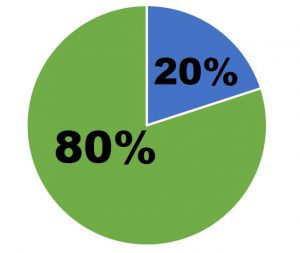 Well, right off the bat, if you look at all of the real medical conditions of the horse – lameness, colic, coughing, to name a few – as long as you don’t do anything that causes direct harm, he’s going to get better.
Well, right off the bat, if you look at all of the real medical conditions of the horse – lameness, colic, coughing, to name a few – as long as you don’t do anything that causes direct harm, he’s going to get better.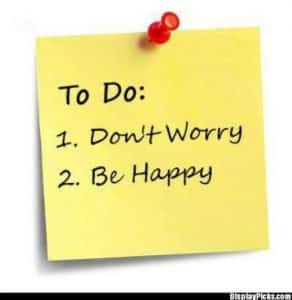 If you think about the 80:15:5 rule, it sort of sets things in perspective. When it comes to horse care – heck, in many parts of life – I think that a lot of people are inclined to immediately think that things are the worst that they can be. Even though most horses are pretty maintenance free, and most conditions get better, people tend to focus on the bad possibilities. Even though most horses go around and do their jobs as well as they can, without much complaint or problem – that’s one of the things we love about them, right? – even so, many people focus most of their attention on one problem: real or perceived.
If you think about the 80:15:5 rule, it sort of sets things in perspective. When it comes to horse care – heck, in many parts of life – I think that a lot of people are inclined to immediately think that things are the worst that they can be. Even though most horses are pretty maintenance free, and most conditions get better, people tend to focus on the bad possibilities. Even though most horses go around and do their jobs as well as they can, without much complaint or problem – that’s one of the things we love about them, right? – even so, many people focus most of their attention on one problem: real or perceived.I think that horse people would be a lot better off – and horses would be a lot happier – if they would remember that, when it comes to horses (as in pretty much every other relationship) nothing is all good or all bad. In fact, mostly – about 80% of the time – it’s pretty good. Horse owners should learn to focus on the good things about horse ownership – all of the times that your horse whinnies when he sees you, or all of the times that he DOES jump the fence, or DOES make a tight turn, or DOES get that lead change – and not dwell too much on the times when something goes wrong. In fact, I think it’s pretty amazing that the put up with as at all!
When it comes to medical problems, I think that people should relax, as well. Sure, if you have a medical concern about your horse, by all means, get him examined by a veterinarian. But once you do that, keep in mind that many (most?) of the things that you do may not make all that much difference, since the horse is going to try to heal himself anyway. If you find that there’s a real problem (the 15%) use a therapy that’s been shown to be likely to be effective. And there’s certainly no reason to pursue costly treatments for problems that may not occur (see, for example, any product that claims that it can prevent arthritis). Even if things are not 80% good, 15% average and 5% bad, then complaining about it or buying some needless product or service still won’t solve the problem.
Why not focus on the positives of horse ownership? You’ll be glad you did and so will the people around you. You’ll probably save a lot of money, too. Sure, there are plenty of problems for which treatment can help. Sure, you should try to find out what’s at the root of something that seems to be bothering your horse. But remember the 80:15:5 rule, too. Most likely, things are going to work out OK.
And last, here’s an old toe-tapper for you.

